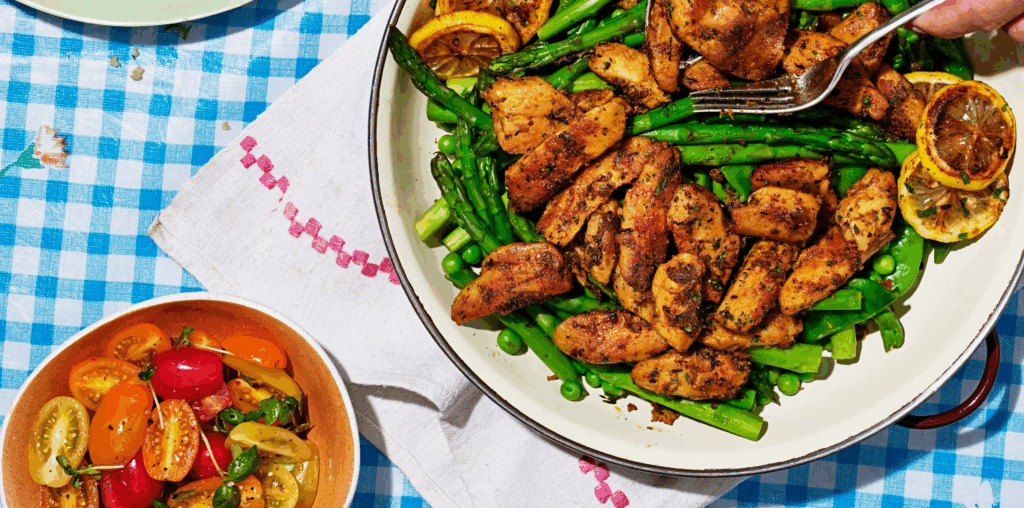The state of plant-based in the Netherlands: retail sales decline despite consumer openness and foodservice growth
The latest data paint a mixed picture for the Dutch plant-based market, despite ambitious targets from the government and industry. We dive into what’s driving the trends and how the sector can unlock future growth.
11 June 2025

The Netherlands has long been a leader in diversifying Europe’s protein system – with world-leading government investment in alternative protein innovation, and a strong range of plant-based options on supermarket shelves.
GFI Europe’s analysis of Circana data shows the Dutch remain the second-highest spenders per capita on plant-based foods among six European countries, behind only Germany – but it also reveals that overall sales declined in 2024.
Here, we dive into some of the trends defining the Dutch plant-based landscape to explore how this mature market might return to growth.
Consumer interest in plant-based foods continues to grow
Recent research by YouGov found that in 2024 62% of Dutch households said they sometimes bought plant-based options in place of meat or fish – an increase of almost 13% since 2020. Young professionals, two-income households and environmentally conscious consumers are the biggest spenders on plant-based foods – but with almost two-thirds of the population already eating plant-based foods occasionally, it’s clear there is huge room for growth.
Government and retailers are committed
Recognising the potential of plant-based foods to drive economic growth, boost food security and help achieve climate and public health goals, the Dutch government has set a target for plant-based protein consumption to equal that of animal-based proteins by 2030.
In support of this national target, at least 11 Dutch retailers have now committed to 60% of their protein sales being plant-based by 2030, and the Protein Tracker shows that the proportion of protein sales that are plant-based in Dutch supermarkets rose slightly, from 40.2% in 2023 to 41.6% in 2024. Retailers Lidl and Jumbo are even incentivising the shift by bringing their own-brand plant-based meat prices into line with those of animal-based equivalents, which led to an increase in plant-based meat sales.
But plant-based meat and dairy sales are down
However, GFI Europe’s latest report shows a decline in Dutch retail sales of plant-based foods over the past two years. Our analysis of Circana data found there was a fall in the combined sales volume of plant-based meat, milk, cheese, yoghurt and cream in 2023 and 2024, following sales growth between 2020 and 2022.
Consumers are using plant-based meat as an ingredient
The total volume of plant-based meat sold fell by 6.2% in 2024 – but a closer look at the data shows that not all formats have been affected equally.
The sales volume of centre-plate options (including burgers, fillets, schnitzel and sausages) fell by 11.0% in 2024, but that of formats more likely to be used as part of a home-cooked recipe (including minced meat, meatballs and strips) fell by only 2.8%.
The relative resilience of cooking ingredients could indicate that consumers are increasingly interested in experimenting with plant-based meat as part of their own recipes, and want the flexibility to add herbs and spices to their liking. As the majority of plant-based meat products don’t yet live up to their animal-based equivalents on taste, it seems more adaptable formats have greater appeal.
It’s also possible that price is driving the trend. While centre-plate options and cooking ingredients were comparable in price in 2022, by 2024, cooking ingredients were 6% cheaper per kg.
It’s essential that government and industry invest in further innovation to close the taste gap across all formats, as well as developing a wider range of plant-based options that consumers can easily incorporate into their everyday meals.
Foodservice sales have accelerated
Professional chefs, too, are experimenting with plant-based cooking. All major caterers have joined Dutch supermarkets in setting targets for 60% of the protein they sell to be plant-based by 2030.
Separate data reported by ProVeg Netherlands has found significant growth in plant-based purchasing by the sector as a result. Between 2021 and 2023, the volume of plant-based meat used by foodservice outlets and caterers grew by 111%, while use of ingredients like plant-based cooking cream surged by 320%.
Taste is king when it comes to our food choices, so it’s encouraging to see the foodservice industry leading the way in making plant-based foods delicious and convenient across the Netherlands. But to achieve the country’s targets for protein diversification, ending the plant-based price premium will also be essential.
Did higher taxes hit plant-based milk sales?
Plant-based milk has long been a leading alternative protein product. Although sales volume declined in 2023 and 2024, the category retained a 7.7% share of the total milk market by volume in 2024.
Circana’s data shows most of the decline was driven by chilled products, which saw a 6.5% increase in their average price per litre in 2024, while prices of ambient products remained steady. Coupled with falling prices for cow’s milk, this meant consumers paid an average 29% price premium for the plant-based option in 2024 – up from 24% in the previous two years.
The fall in sales also coincided with an increase in tax on plant-based milk (excluding soy milk) from €0.09 to €0.26 per litre, which was implemented on 1 January 2024. Cow’s milk was exempt from this tax increase. This policy is at odds with the Dutch government’s protein diversification target, penalising consumers who want to make more sustainable choices, and unfairly increasing costs for those with allergies and intolerances.
But our analysis suggests it was just one factor driving up prices for plant-based milk in 2024, as soy milk was also affected and chilled products were hardest hit – suggesting energy costs may have played a role. It is also possible that, since the tax is levied on producers and companies sell several types of plant-based milk, they might have decided to spread the impact on consumers by increasing prices across all of their products, rather than only those directly affected by the tax.
If it is serious about reaping the benefits of protein diversification, the Dutch government must reverse the tax hike on plant-based milk and invest in creating the robust supply chains and infrastructure the sector needs to scale.
Plant-based yoghurt defies the trend
The one exception to the decline was in plant-based yoghurt, which saw sales volume rebound by 4.9% in 2024 after a dip in 2023. Our analysis suggests this may have been driven by a fall in prices.
While plant-based yoghurt remains more expensive than its animal-based equivalent, that price gap fell from 58% in 2022 to 30% in 2024. It’s positive that supermarkets are launching own-label plant-based yoghurts that are helping to drive average prices down, but it’s crucial that quality continues to improve so products meet consumer expectations on taste and texture.
Eliminate compromise to secure future growth
In a mature market like the Netherlands, where plant-based foods are reaching mainstream status, further growth is far from guaranteed until consumers can make sustainable choices without compromise.
It’s clear that government, industry and consumers want to see a shift to plant-based. To meet their targets on protein diversification, climate and public health, the government and the food industry must invest in developing plant-based meat and dairy that matches animal products on taste and price.
Acknowledgements
This article benefited from additional insights from ProVeg Netherlands.
